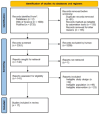The effects of physical activity on self-esteem in older adults: a systematic review
- PMID: 40556927
- PMCID: PMC12185534
- DOI: 10.3389/fpubh.2025.1595087
The effects of physical activity on self-esteem in older adults: a systematic review
Abstract
Background: The aim of this systematic review was to evaluate the impact of physical activity on self-esteem levels in older adults.
Methods: This review was conducted in accordance with PRISMA 2020 guidelines. PubMed and Web of Science databases were searched using the following terms (in English): (physical activity OR physical exercise OR training) AND (self-esteem OR self-confidence OR self-respect) AND (male OR female) AND older adults.
Results: Out of 3,732 identified publications, after removing duplicates and initial screening, 17 studies were ultimately included in the analysis (total of 1,820 participants). All included studies showed a statistically significant positive relationship between regular physical activity and higher self-esteem in older adults. Particularly beneficial effects were observed for aerobic training (e.g., walking, jogging, cycling), yoga sessions, and exercises targeting strength, endurance, and coordination development.
Conclusion: Regular participation in activities such as walking, yoga, and moderate-intensity exercises positively influences self-esteem in older adults, making physical activity an important factor for psychological well-being in later life.
Systematic review registration: The systematic review was registered in the PROSPERO database and is available under the ID number: CRD420251011376, https://www.crd.york.ac.uk/PROSPERO/view/CRD420251011376.
Keywords: aging; exercise; physical activity; self-esteem; training.
Copyright © 2025 Mijalković, Stojanović, Lilić, Ilić, İlbak, Kasicki, Niewczas-Czarny, Ambroży and Rydzik.
Conflict of interest statement
The authors declare that the research was conducted in the absence of any commercial or financial relationships that could be construed as a potential conflict of interest.
Similar articles
-
Physical activity and exercise for chronic pain in adults: an overview of Cochrane Reviews.Cochrane Database Syst Rev. 2017 Apr 24;4(4):CD011279. doi: 10.1002/14651858.CD011279.pub3. Cochrane Database Syst Rev. 2017. PMID: 28436583 Free PMC article.
-
Physical activity and exercise for chronic pain in adults: an overview of Cochrane Reviews.Cochrane Database Syst Rev. 2017 Jan 14;1(1):CD011279. doi: 10.1002/14651858.CD011279.pub2. Cochrane Database Syst Rev. 2017. Update in: Cochrane Database Syst Rev. 2017 Apr 24;4:CD011279. doi: 10.1002/14651858.CD011279.pub3. PMID: 28087891 Free PMC article. Updated.
-
Parent-training programmes for improving maternal psychosocial health.Cochrane Database Syst Rev. 2004;(1):CD002020. doi: 10.1002/14651858.CD002020.pub2. Cochrane Database Syst Rev. 2004. Update in: Cochrane Database Syst Rev. 2012 Jun 13;(6):CD002020. doi: 10.1002/14651858.CD002020.pub3. PMID: 14973981 Updated.
-
Physical activity for treatment of irritable bowel syndrome.Cochrane Database Syst Rev. 2022 Jun 29;6(6):CD011497. doi: 10.1002/14651858.CD011497.pub2. Cochrane Database Syst Rev. 2022. PMID: 35766861 Free PMC article.
-
Effect of dance on social physique anxiety and physical self-esteem among adults: a systematic review.Front Psychol. 2025 Jun 4;16:1547802. doi: 10.3389/fpsyg.2025.1547802. eCollection 2025. Front Psychol. 2025. PMID: 40535192 Free PMC article.
References
-
- World Health Organization (WHO) . (2020). Decade of healthy ageing 2021–2030. Available online at: https://www.who.int/initiatives/decade-of-healthy-ageing (Accessed January 10, 2025).
-
- Berger BG, Tobar D. Physical activity and quality of life In: Tenenbaum G, Eklund RC, editors. Handbook of sport psychology. Hoboken: Wiley; (2007). 598–620.
-
- Kochman M, Kielar A, Kasprzak M, Javdaneh N, Kasperek W. Selected environmental factors determining motor abilities and physical fitness in adolescents. J Kinesiol Exerc Sci. (2023) 33:18–26. doi: 10.5604/01.3001.0053.8077 - DOI
-
- Ružbarská B, Kačúr P, Vašková M, Chovanová E. Age and gender differences in the level of motor docility, selected cognitive and motor-cognitive abilities of older school-age children. J Kinesiol Exerc Sci. (2023) 33:28–37. doi: 10.5604/01.3001.0053.5982 - DOI
Publication types
MeSH terms
LinkOut - more resources
Full Text Sources
Medical


